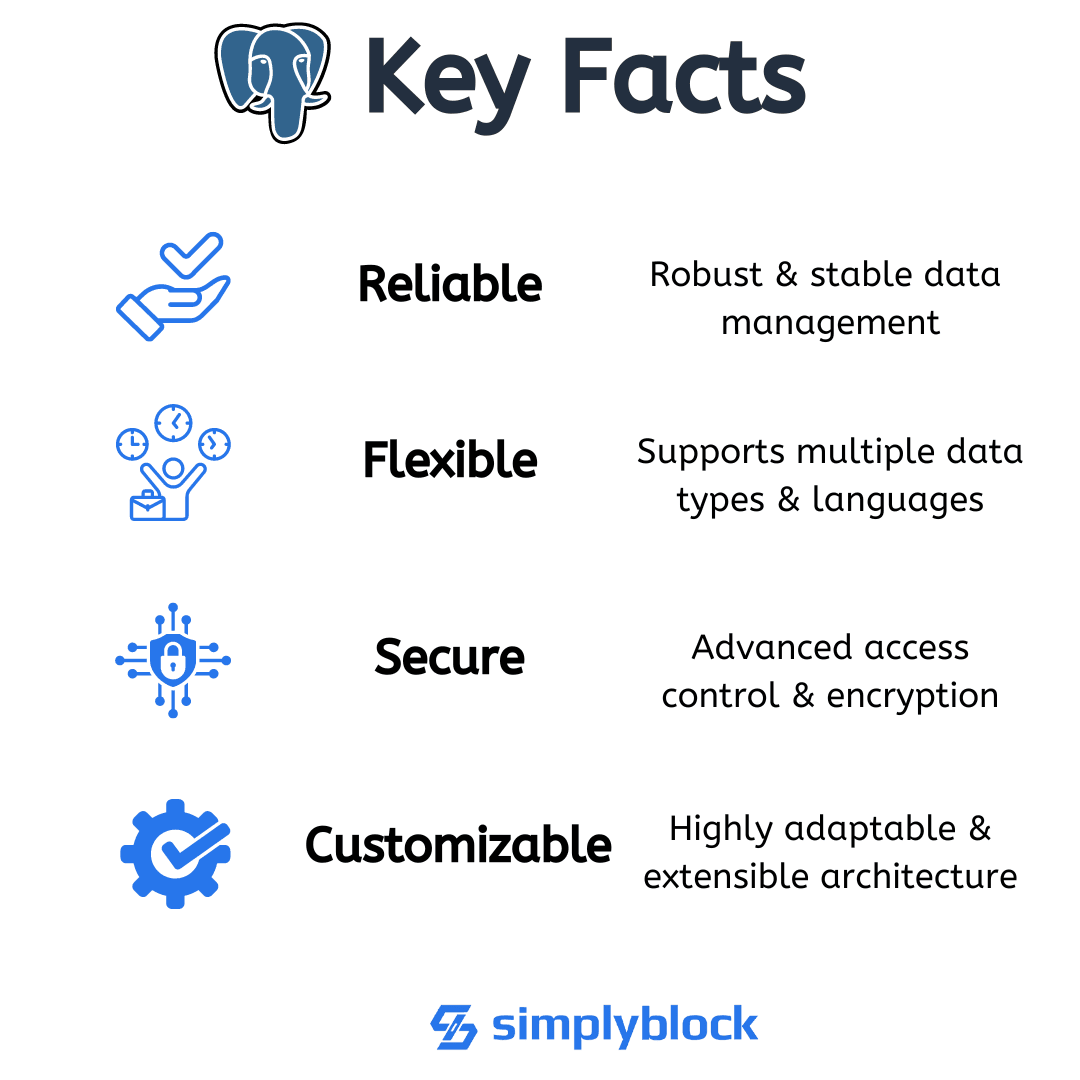PostgreSQL
Terms related to simplyblock
PostgreSQL is an advanced open-source relational database management system (RDBMS) known for its standards compliance, extensibility, and strong support for both OLTP (Online Transaction Processing) and analytical workloads. Originating from the POSTGRES project at UC Berkeley, PostgreSQL has evolved into one of the most feature-rich, SQL-compliant, and community-supported databases available today.
It supports ACID transactions, complex queries, full-text search, geospatial data (via PostGIS), and custom data types, making it a top choice for developers, enterprises, and cloud-native platforms alike.
Core Features of PostgreSQL
PostgreSQL offers enterprise-grade database features without the licensing cost of proprietary systems. Some of its core features include:
- ACID Compliance: Ensures atomicity, consistency, isolation, and durability across all transactions.
- MVCC (Multiversion Concurrency Control): Enables high concurrency with minimal locking.
- Advanced Indexing: Supports B-tree, GIN, GiST, BRIN, and hash indexes.
- Extensibility: Add custom data types, operators, and index methods.
- Full SQL Support: Adheres closely to ANSI SQL with advanced joins, views, triggers, and stored procedures.
- Foreign Data Wrappers (FDWs): Connects to other databases and data sources.
- Partitioning: Efficient horizontal scaling for large datasets.
- Security: Includes role-based access control, SSL encryption, and row-level security.
PostgreSQL also supports modern workloads through native JSON/JSONB data types, enabling semi-structured document storage alongside relational data.
PostgreSQL vs Other SQL Databases
PostgreSQL is often chosen for complex, data-intensive workloads that require high reliability, strong compliance, and customization. Below is a feature comparison:
Comparison Table
| Feature | PostgreSQL | MySQL | Microsoft SQL Server | Oracle Database |
|---|---|---|---|---|
| License | Open-source (PostgreSQL) | Open-source (GPL) | Proprietary | Proprietary |
| ACID Compliance | Full | Partial (depends on engine) | Full | Full |
| JSON Support | JSON / JSONB | Basic JSON | Native JSON | JSON-compatible |
| Concurrency Model | MVCC | Lock-based | MVCC | MVCC |
| Extensibility | High | Limited | Moderate | Low (custom PL/SQL) |
| Best Fit For | Enterprise + Custom | Web + CMS | Enterprise Systems | Mission-Critical |
PostgreSQL is ideal for developers, DevOps, and architects who require a highly reliable and standards-compliant database without vendor lock-in.
Use Cases for PostgreSQL
PostgreSQL supports a diverse range of use cases in modern software systems:
- Web and SaaS Platforms: Backend for APIs, services, and transactional applications.
- Analytics and BI: Columnar extensions (like Citus) enable real-time analytics.
- Geospatial Applications: With the PostGIS extension, PostgreSQL becomes a powerful spatial database.
- Document Store Replacement: JSONB allows PostgreSQL to act as a semi-structured document store.
- Enterprise Systems: Backend for ERP, CRM, and financial systems requiring integrity and security.
For stateful applications in Kubernetes environments, PostgreSQL’s performance scales significantly when backed by low-latency NVMe storage from simplyblock™, especially when write-ahead logs and IOPS bottlenecks are addressed through optimized block storage.
Storage Performance and PostgreSQL
PostgreSQL’s performance is heavily influenced by disk I/O, particularly during:
- WAL (Write-Ahead Logging): Ensures durability and crash recovery.
- Checkpoints: Periodically flush data pages to disk.
- Autovacuum: Manages table bloat; requires fast read/write cycles.
- Index Maintenance: High-performance NVMe storage accelerates reindexing and query optimization.
By leveraging NVMe over TCP on simplyblock’s™ software-defined storage platform, PostgreSQL benefits from:
- Sub-millisecond latency
- High throughput for WAL and checkpoints
- Erasure coding for redundancy without replication overhead
- Thin provisioning to optimize resource usage
PostgreSQL in Kubernetes and Hybrid Cloud
PostgreSQL is Kubernetes-ready through Operators like CrunchyData and Zalando, and supports:
- Dynamic Persistent Volumes via CSI drivers
- StatefulSet-based high availability
- Hot backups and cloning for development/testing
- Disaster recovery using WAL-G, pgBackRest, or continuous archiving
Using simplyblock for Kubernetes, PostgreSQL deployments benefit from:
- Automatic failover and storage migration
- Volume snapshots for quick backup/restore
- High-performance NVMe-backed persistent storage
- Storage scalability across clusters and cloud zones
External References
Questions and Answers
PostgreSQL is an advanced open-source relational database known for its reliability, extensibility, and standards compliance. It supports complex queries, JSON, full-text search, and custom extensions, making it ideal for modern web, analytics, and enterprise applications.
Absolutely. PostgreSQL runs reliably on Kubernetes using operators like Crunchy or Zalando. For persistent and high-performance workloads, pair it with Kubernetes-native NVMe storage to ensure fast failover, stable performance, and data integrity.
PostgreSQL benefits from low-latency, high-throughput storage, especially for write-heavy OLTP workloads. NVMe over TCP and software-defined storage offer optimal performance for indexing, replication, and high-concurrency workloads.
PostgreSQL supports encryption through file system or storage-layer integration. To enhance data security and compliance, use storage platforms like Simplyblock that provide encryption-at-rest with per-volume key isolation for multi-tenant deployments.
PostgreSQL scales vertically and horizontally using extensions like Citus for distributed workloads. Combined with Simplyblock for PostgreSQL, you can scale securely and cost-effectively with high-performance storage across cloud-native and hybrid environments.

